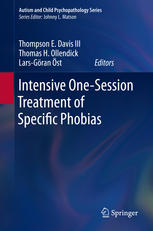

Most ebook files are in PDF format, so you can easily read them using various software such as Foxit Reader or directly on the Google Chrome browser.
Some ebook files are released by publishers in other formats such as .awz, .mobi, .epub, .fb2, etc. You may need to install specific software to read these formats on mobile/PC, such as Calibre.
Please read the tutorial at this link: https://ebookbell.com/faq
We offer FREE conversion to the popular formats you request; however, this may take some time. Therefore, right after payment, please email us, and we will try to provide the service as quickly as possible.
For some exceptional file formats or broken links (if any), please refrain from opening any disputes. Instead, email us first, and we will try to assist within a maximum of 6 hours.
EbookBell Team

4.8
54 reviewsWhether it’s dogs, spiders, blood, heights or some other fear, specific phobias are one of the most prevalent mental health problems, affecting as many as one in eight people. In recent years, cognitive-behavioral therapy (CBT) has emerged as particularly effective in treating young people and adults with specific phobias. And of these methods, one-session treatment stands out as a long-lasting, cost-effective intervention of choice.
Intensive One-Session Treatment of Specific Phobias not only provides a summary of the evidence base, it also serves as a practical reference and training guide. This concise volume examines the phenomenology, epidemiology, and etiology of phobias, laying the groundwork for subsequent discussion of assessment strategies, empirically sound one-session treatment methods, and special topics. In addition, expert contributors address challenges common to exposure therapy, offer age-appropriate guidelines for treating young clients, and describe innovative computer-assisted techniques.
Organized to be read individually or in sequence, chapters delve into key areas, including:
Intensive One-Session Treatment of Specific Phobias is an essential resource for researchers, clinicians, and graduate students in child, school, clinical, and counseling psychology; social work; and general and special education.